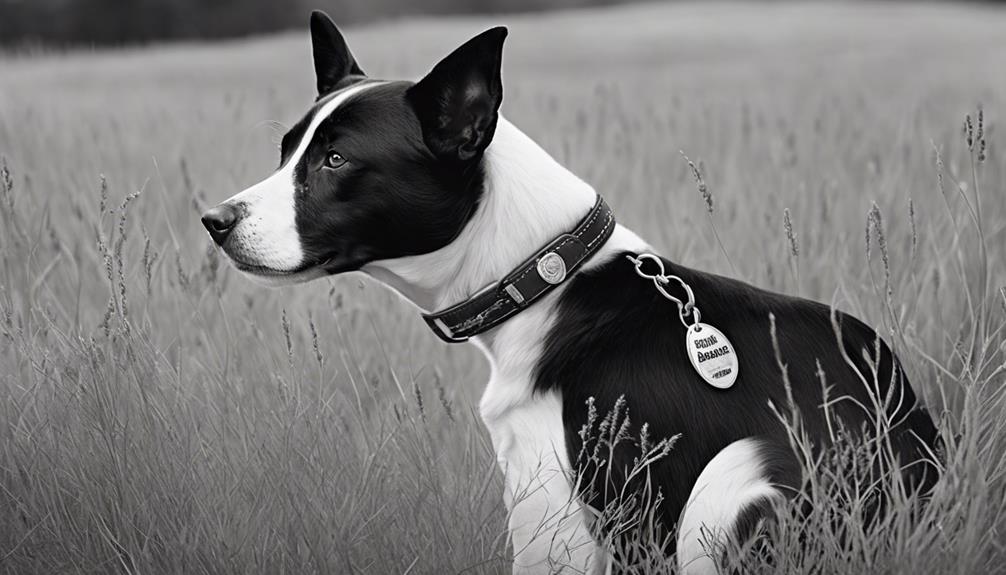Yes, mistletoe is harmful to dogs. It contains viscumin in its berries and leaves. If ingested, it can cause severe symptoms like vomiting, diarrhea, and breathing difficulties. In serious cases, mistletoe poisoning may lead to abnormal heart rate, seizures, or even death. Immediate veterinary care is essential if you suspect your dog has eaten mistletoe. Remember, prevention is vital to keeping your furry friend safe. If you want to know more about mistletoe toxicity and how to protect your dog, explore further into mistletoe poisoning information.
Key Takeaways
- Viscumin in mistletoe is toxic to dogs.
- Ingestion leads to vomiting, diarrhea, and stomach pain.
- Severe cases can cause abnormal heart rate and seizures.
- Immediate veterinary care is crucial if ingestion occurs.
- Prevention includes keeping mistletoe out of dogs' reach.
Mistletoe Toxicity in Dogs
Mistletoe poses a significant risk to dogs due to the poison called viscumin found in its berries and leaves. This plant, often seen during the holiday season, can be harmful to our furry friends if ingested. Signs of mistletoe toxicity in dogs include symptoms such as abdominal pain, vomiting, diarrhea, and breathing difficulties.
If a dog consumes mistletoe, it can result in serious consequences like abnormal heart rate, seizures, and even death. To keep our canine companions safe, it's vital to seek immediate veterinary care if mistletoe ingestion is suspected.
Prevention is key in protecting dogs from mistletoe toxicity; always make sure mistletoe is kept out of their reach to avoid any accidental ingestion. Remember, being aware of the potential dangers mistletoe presents to dogs is the first step in ensuring their well-being during the festive season and beyond.
Symptoms of Mistletoe Poisoning

Symptoms of mistletoe poisoning in dogs can include:
- Drooling
- Vomiting
- Diarrhea
- Stomach pain
In severe cases, additional symptoms may manifest such as:
- Abnormal heart rate
- Hypotension
- Ataxia
- Seizures
If your dog displays any of these signs, it is crucial to seek immediate veterinary attention for proper diagnosis and treatment.
Toxicity Symptoms in Dogs
Upon ingestion, mistletoe poisoning in dogs manifests through symptoms such as drooling, vomiting, diarrhea, and stomach pain. These symptoms are indicative of gastrointestinal upset and can vary in intensity depending on the amount of mistletoe ingested.
In severe cases of mistletoe poisoning, dogs may experience abnormal heart rate, low blood pressure, lack of coordination, and seizures. It's essential to monitor your dog closely if you suspect mistletoe ingestion, as symptoms typically appear within a few hours post-ingestion.
Immediate veterinary attention is vital to guarantee proper diagnosis and treatment. Remember, prompt action can make a significant difference in your dog's recovery from mistletoe poisoning.
Immediate Veterinary Attention
Seek immediate veterinary attention if your dog exhibits any signs of mistletoe poisoning. Symptoms may include drooling, vomiting, diarrhea, and stomach pain. In severe cases, watch for abnormal heart rate, hypotension, ataxia, or seizures.
It's essential to act fast if you suspect mistletoe ingestion, as symptoms typically show within hours. When seeking help, provide details about your dog's health, the amount ingested, and any observed symptoms. Remember, early intervention is vital in treating mistletoe poisoning.
Your veterinarian will assess the situation and provide the necessary care to help your furry friend recover. Don't delay in getting the help your dog needs if you notice any concerning signs.
Causes of Mistletoe Toxicity

Exposure to viscumin, a cytotoxin present in mistletoe berries, is the primary cause of mistletoe toxicity in dogs. Viscumin is a potent substance that can lead to severe symptoms when ingested by our furry friends.
The high concentration of viscumin in mistletoe berries is what makes them so toxic to dogs. If a dog consumes mistletoe berries or leaves containing this cytotoxin, it can result in gastrointestinal upset and breathing difficulties.
Even accidental exposure to mistletoe in the home environment can contribute to mistletoe toxicity in dogs. It's essential to be vigilant and keep mistletoe plants out of reach of our pets.
If you suspect your dog has ingested mistletoe, immediate veterinary attention is necessary to address the toxicity effectively. Remember, timely identification and proper care are vital in ensuring the well-being of our canine companions when it comes to mistletoe poisoning.
Diagnosing Mistletoe Poisoning

When suspecting mistletoe ingestion in dogs, immediate veterinary examination is vital to diagnose and address potential poisoning effectively. The vet will perform a thorough examination and may conduct tests to determine the extent of mistletoe poisoning. It's essential to provide the vet with details about the dog's health, the amount of mistletoe ingested, and any observed symptoms for an accurate diagnosis. If possible, bringing the plant to the vet can assist in identifying the specific type of mistletoe consumed.
Consulting the Pet Poison Helpline for advice on mistletoe poisoning in dogs can provide additional guidance during this process. The experts at the helpline can offer valuable insights and recommendations based on the specific situation. Remember, swift action and collaboration with veterinary professionals are key in ensuring the best possible outcome for a dog that has ingested mistletoe.
Treating Mistletoe Toxicity

When a pet shows symptoms of mistletoe toxicity, such as vomiting or diarrhea, it's essential to seek veterinary care promptly.
Treatment may involve inducing vomiting, administering activated charcoal, and providing supportive measures like IV fluids and gastroprotective medications.
In severe cases, potential complications like liver damage might require hepatoprotective medications under the close monitoring of a veterinarian.
Symptoms of Toxicity
In cases of mistletoe toxicity in dogs, recognizing symptoms promptly is essential for effective treatment. Dogs may experience gastrointestinal upset, vomiting, diarrhea, and stomach pain after ingesting mistletoe. Severe cases can lead to abnormal heart rate, hypotension, ataxia, and seizures. The severity of symptoms depends on the amount consumed. Immediate veterinary attention is critical if mistletoe poisoning is suspected. Treatment may involve inducing vomiting, providing IV fluids, and monitoring the dog for 24 hours. Here is a table summarizing common symptoms of mistletoe poisoning in dogs:
| Symptoms | Description |
|---|---|
| Gastrointestinal upset | Stomach discomfort and drooling |
| Vomiting | Forceful expulsion of stomach contents |
| Diarrhea | Loose or watery stools |
Veterinary Care Needed
Veterinary care for mistletoe toxicity typically involves inducing vomiting, administering activated charcoal, and providing supportive measures like IV fluids. If your dog ingests mistletoe, it's essential to seek immediate veterinary care. Inducing vomiting can help remove the toxin from the stomach, while activated charcoal can absorb any remaining toxins.
IV fluids are vital to maintain hydration and support organ function during treatment. A veterinarian will conduct a thorough examination, including blood tests, to assess the severity of the poisoning. The amount ingested and observed symptoms will also be considered in determining the appropriate treatment.
Potential Complications Treated
Upon mistletoe toxicity, potential complications such as gastrointestinal distress and erratic behavior may arise, necessitating prompt and thorough treatment.
Gastrointestinal distress can manifest as vomiting, diarrhea, and abdominal pain, while breathing issues may include difficulty breathing or rapid breathing.
In severe cases, cardiovascular collapse, characterized by a sudden drop in blood pressure and heart rate, can occur.
Treatment for these complications may involve inducing vomiting to remove the toxin, administering activated charcoal to prevent further absorption, providing IV fluids to support hydration, oxygen therapy to aid breathing, and gastroprotective medications to soothe the stomach.
Monitoring for lingering symptoms and seeking immediate veterinary care are essential to address mistletoe toxicity complications and prevent long-term health issues.
Recovery From Mistletoe Poisoning

Monitoring for lingering symptoms and scheduling follow-up veterinary visits are essential steps in the recovery process from mistletoe poisoning in dogs. Dietary adjustments may be necessary depending on the severity of mistletoe poisoning. Ensuring your dog's diet is appropriate for their recovery can aid in their healing process. Additionally, preventing future exposure to mistletoe is critical for the well-being of dogs affected by mistletoe poisoning. This includes being vigilant about the plants in your surroundings and keeping mistletoe out of reach of your pets.
Educating yourself about toxic plants like mistletoe can help prevent future incidents of poisoning in dogs. Understanding the dangers associated with certain plants can empower you to create a safe environment for your furry friend.
Veterinary guidance and support play an important role in the proper management and recovery of dogs from mistletoe poisoning. Working closely with your veterinarian can ensure that your dog receives the necessary care and attention during their recovery process.
Veterinary Insights on Mistletoe Poisoning

Educating ourselves about the symptoms and dangers of mistletoe poisoning in dogs is essential for prompt identification and treatment. If your furry friend ingests mistletoe, it's important to recognize the signs early on. Symptoms of mistletoe poisoning in dogs can include drooling, vomiting, diarrhea, and stomach pain. In severe cases, dogs may experience abnormal heart rate, hypotension, ataxia, and seizures, indicating a more serious situation that requires immediate veterinary attention.
When seeking veterinary help for mistletoe ingestion, the veterinarian will conduct a thorough examination, run tests, and gather information about the ingestion and observed symptoms. Treatment for mistletoe poisoning in dogs will vary depending on the amount ingested and the specific symptoms present. It's essential to act swiftly and follow the guidance of the veterinary professionals to guarantee the best possible outcome for your canine companion. If you suspect mistletoe poisoning, don't hesitate to contact a vet immediately for expert care.
Preventing Mistletoe Exposure in Dogs

To prevent mistletoe exposure in dogs, make sure mistletoe is placed in high or secured locations out of their reach. Dogs are curious animals and may be tempted to investigate plants within their reach, especially during the holiday season when mistletoe is commonly used as decoration.
Educating family members and guests about the toxicity of mistletoe to dogs is essential in making sure everyone is mindful of where it's placed. Consider using artificial mistletoe as a safer alternative in homes with dogs to eliminate the risk of accidental ingestion.
Regularly checking for fallen mistletoe berries or leaves is important to ensure dogs can't access them, as even a small amount can be harmful. By taking these preventive measures, you can create a safe environment for your furry companions and enjoy the festive traditions without putting them at risk of mistletoe toxicity.
Frequently Asked Questions
What Happens When a Dog Eats Mistletoe?
When a dog eats mistletoe, various symptoms can occur, such as drooling, vomiting, diarrhea, and stomach pain. In severe cases, mistletoe poisoning can lead to abnormal heart rate, seizures, and ataxia. The severity of these symptoms depends on the amount of mistletoe ingested.
Immediate veterinary care is essential to prevent serious health complications. Keeping mistletoe out of reach of dogs is the best way to prevent poisoning incidents.
Can Mistletoe Cause Seizures in Dogs?
Yes, mistletoe can cause seizures in dogs. The toxic compounds in mistletoe, like viscotoxin, can lead to neurological symptoms such as seizures. The severity of these seizures depends on the amount ingested and the dog's sensitivity.
If a dog shows signs of seizures after consuming mistletoe, immediate veterinary attention is essential to prevent further complications. It's important to keep mistletoe away from pets to avoid such risks.
Is Mistletoe Good for Dogs?
Mistletoe isn't good for dogs. It can be vital if ingested, leading to symptoms like drooling, vomiting, diarrhea, and stomach pain. In severe cases, mistletoe poisoning can cause dangerous issues such as abnormal heart rate, hypotension, ataxia, and seizures.
It's essential to keep mistletoe out of your furry friend's reach and seek immediate veterinary care if ingestion occurs to prevent serious health complications or even death. Stay informed and take precautions to protect your pet during the holidays.
Is Dried Mistletoe Poisonous to Cats?
Dried mistletoe remains toxic to cats due to compounds like viscotoxin. Ingestion can lead to severe symptoms such as vomiting, diarrhea, and abdominal pain. Cats may also suffer from neurological signs and life-threatening complications. Immediate veterinary care is crucial if a cat ingests dried mistletoe to prevent serious harm.
Can Mistletoe Poisoning in Dogs Have Similar Symptoms to Yucca Plant Toxicity?
Mistletoe poisoning in dogs can present similar symptoms to yucca plant toxicity. Both yucca plants toxic to dogs and mistletoe can cause vomiting, diarrhea, and a range of other gastrointestinal issues in pets. It’s important to seek immediate veterinary care if you suspect your dog has ingested either of these toxic plants.
Conclusion
To sum up, mistletoe can be toxic to dogs, causing symptoms like vomiting and diarrhea. One small berry can result in serious health issues.
Remember to keep mistletoe out of reach from your furry friends during the holidays to prevent any accidents. It's better to be safe than sorry when it comes to your pet's well-being.
Always consult your veterinarian if you suspect your dog has ingested mistletoe. Stay vigilant and keep your pup safe this holiday season.










